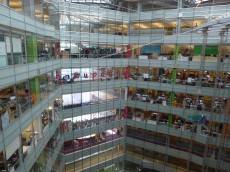February 12, 2014
Small steps to innovation debated at Workplace Futures 2014
New or refurbished workplaces are often described as ‘innovative.’ But while the architect and designers behind a building’s design are often credited with innovation, when it comes to the FMs tasked with managing the property, things are less clear cut. Although the FM sector is increasingly under pressure to demonstrate innovation, whether as services provider or as an in-house department; determining what exactly this constitutes, much less being able to demonstrate it in practice, is a lot more difficult. The 2014 i-FM Workplace Futures Conference, held this week at the Siemens Crystal building in London’s Docklands, bravely aimed to address this conundrum. It was, as the organisers admitted, a tall order to ‘nail this innovation theme,’ but it seems that taking small incremental steps may be the key to success. More →























February 3, 2014
3D printed pizzas – the future of fast food for (very) remote workers
by Mark Eltringham • Comment, Flexible working
More →